#Hong Kong tourist places
Explore tagged Tumblr posts
Text
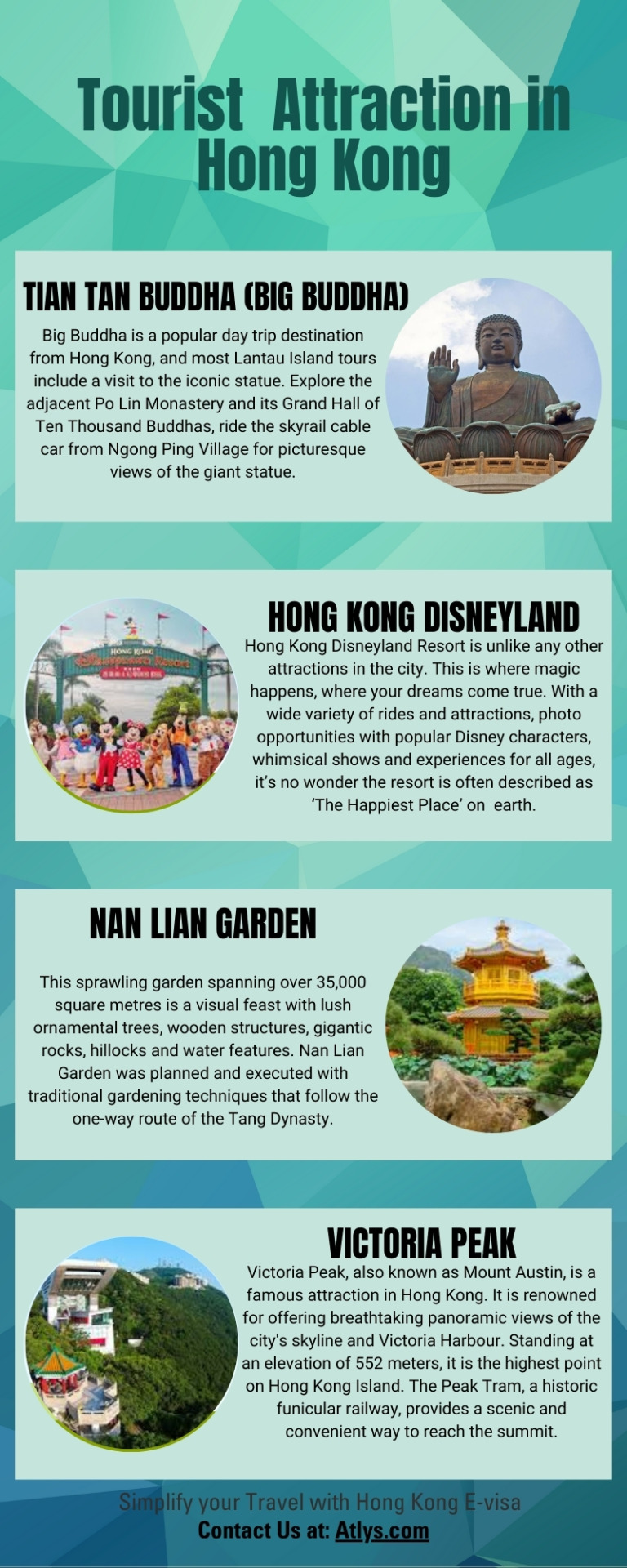
Explore the captivating sights of Hong Kong with our comprehensive infographic. Discover top attractions, hidden gems, and essential e-visa information for a seamless travel experience.
#Hong Kong tourist places#Hong Kong visa for indians#Hong Kong travel destinations#Top attractions in Hong Kong#Hong Kong visa information#Explore Hong Kong#Must-visit places in Hong Kong#Hong Kong sightseeing#Travel tips for Hong Kong#Hong Kong travel guide
0 notes
Text
Hong Kong offers a fusion of modern skyscrapers and traditional Chinese culture. Discover the top places to visit in Hong Kong in 2025, from the bustling streets of Mong Kok to the serene beauty of Victoria Peak. This travel guide also features the best shopping, dining, and cultural experiences that make Hong Kong one of the world’s most exciting cities to explore.
#places to visit Hong Kong#Hong Kong tourist spots#Hong Kong travel guide#Hong Kong attractions#explore Hong Kong
0 notes
Text
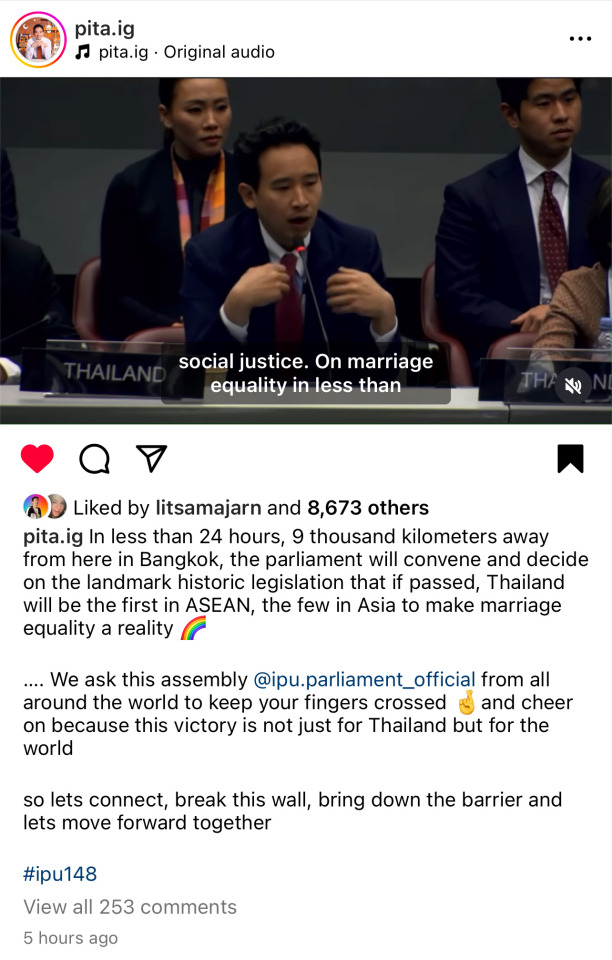
(Source)
The Lower House (House of Representatives) will be hearing Thailand’s marriage equality bill at 9:30 am Bangkok time (10:30 pm Eastern for those of us in the States). The bill, if passed, would still have to be approved in Thailand’s Senate.
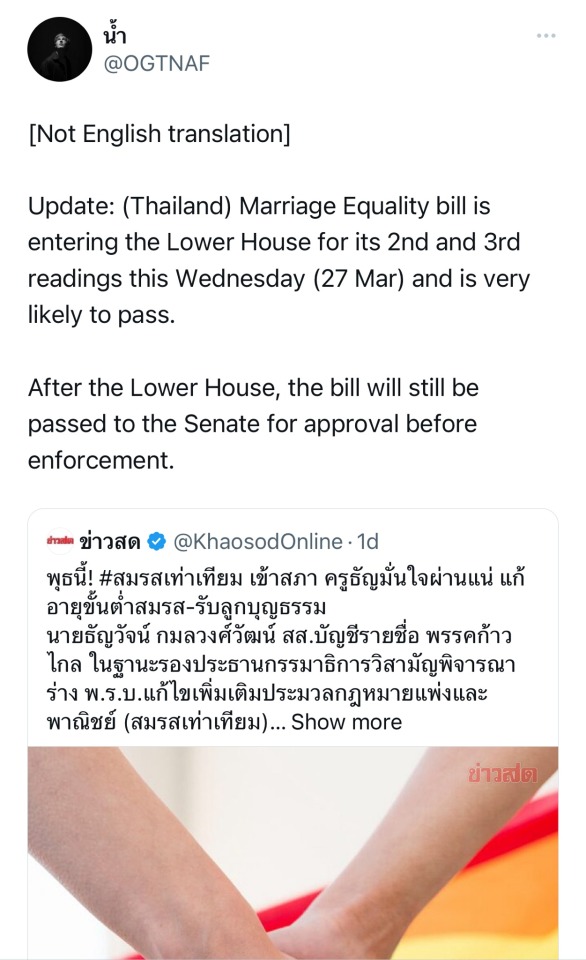
(Source and source)
Below the fold is Bloomberg.com's report on the happenings (source):
Bill to Legalize Same-Sex Marriage in Thailand Heads to Parliament
Bill is supported by most major parties, needs king approval
Thailand would be first in region to codify marriage equality
By Patpicha Tanakasempipat, March 26, 2024 at 2:00 PM PDT
A bill to legalize same-sex marriage could face a vote in Thailand’s parliament as early as Wednesday. If it passes, the country will be the first in Southeast Asia to establish marriage rights for gay and lesbian couples.
The House of Representatives will take up the legislation, technically an amendment to the Civil and Commercial Code, for second and third readings when it meets at 9 a.m. Lawmakers may vote later in the day.
The bill would legalize marriage for same-sex partners aged 18 and above, along with rights to inheritance, tax allowances and child adoption, among others. Prime Minister Srettha Thavisin’s administration has made it a signature issue, and advocates say it would also burnish Thailand’s reputation as an LGBTQ-friendly tourist destination.
Taiwan and Nepal are the only places in Asia that currently recognize same-sex marriage, and recent efforts elsewhere in the region have had mixed results. Hong Kong has yet to comply with a 2023 court order to establish laws recognizing same-sex partnerships, and India’s Supreme Court refused to legalize same-sex marriage, saying it’s an issue for parliament to consider.
The Thai bill would change the composition of a marriage from “a man and a woman” to “two individuals,” and change the official legal status from “husband and wife” to “married couple.”
Thai laws have protected LGBTQ people from most kinds of discrimination since 2015, but attempts to formalize marriage rights have stalled. In 2021, the Constitutional Court upheld the law recognizing marriage as exclusively between a man and a woman. Last year, a bill to recognize same-sex civil partnerships failed to clear parliament ahead of elections.
Rights advocates have higher hopes for the bill pending now, noting that it has broad support from most of the major parties. If it passes, it will need to be approved by the Senate and endorsed by the King. Then it would be published in the Royal Gazette and take effect 120 days later.
Srettha’s government has also promised to work on a bill to recognize gender identity, and the health ministry has also proposed legalizing commercial surrogacy to allow LGBTQ couples to adopt children. Thailand is seeking to host the WorldPride events in Bangkok in 2028.
Legalizing same-sex marriage could have positive effects on tourism, which contributes about 12% to the nation’s $500 billion economy. In 2019, before the pandemic froze international tourism, LGBTQ travel and tourism to Thailand generated about $6.5 billion, or 1.2% of gross domestic product, according to industry consultant LGBT Capital.
Formal recognition could boost the reputation of a place already considered one of Asia’s best for LGBTQ visitors, said Wittaya Luangsasipong, managing director of Siam Pride, an LGBTQ-friendly travel agency in Bangkok.
“It will become a selling point for Thailand and raise our strength in the global stage,” Wittaya said. “It will create a relaxed and safe atmosphere for tourism and help attract more and more LGBTQ visitors. We could also see more weddings by LGBTQ couples, which could generate income across industries and local communities.”
#marriage equality#marriage equality in thailand#thailand#thailand politics#pita limjaroenrat#srettha thavisin#this article is a very good look-see into how thailand has continued to leverage LGBTQ+ rights for soft power and now even hard power#lgbtq+#mileapo and freenbecky just visited with the prime minister last week#same sex marriage#same sex marriage equality
200 notes
·
View notes
Text
If you're from Argentina, you've probably heard about the Iberá wetlands, and you know the tourist pitch: a vast expanse of natural wonders in the middle of Corrientes, full of beautiful lapachos, cute carpinchos and yacarés, and now home to the fastest-growing wild yaguareté population, all with the unique Guaraní influenced culture of rural Corrientes.
Now, things aren't as shiny as they look, since the creation and management of the new national park is still a point of contention in many ways, but you will be suprised that this kind of thinking about the Iberá is very, very recent. Most people considered it an obstacle to progress, a big bunch of swamp in the middle of what could be a very productive ranching province. In a geography book from the 1910s (unfortunately I lost the screencap) it says something like "the biggest obstacle for the development of the province is this swamp, and it should be drained"
This took me to the other side of the world, to the Netherlands. They're known for land reclamation, from literally building their country from the sea. Especially when we're facing rising sea levels because of climate change, the Dutch seem like miracle workers, a look into our future. You will find no shortage of praise about how with some windmills and dams, the Dutch took land "from the sea", and turned it into quaint little polders, making a tiny country in Europe a food exporter and don't they look so nice? But when you look about it, you can barely find anything about what came before those polders. You have to dig and dig to find any mentions of not "sea", but of complex tidal marshes and wetlands, things I've learned are ecologically diverse and protected in many places, but you won't find people talking about that at all when talking about the Netherlands. It's all just polders now. What came before was useless swamp, or a sea to be triumphantly conquered. It's like they were erased from history
The use of that language reminded me of the failed vision of draining Iberá... and the triumphing vision in the Netherlands, and many other places. Maybe those wonderful places, those unique wetlands, would have been a footnote, you wouldn't find anything unless you were a bored ecologist who looked, and not even then. Now, far it be from me to accuse the medieval Dutch, who wanted to have more space to farm, of ecocide. And don't think this is going to be a rant against European ecological imperialism either, as the most anthropized places you can find are actually in China and India. But it does get me thinking.
I work with the concept of landscape, and landscape managing. (Not landscaping, those guys get better paid than me) The concept of landscape is somewhat similar to the concept of ecosystem you know from basic biology, but besides biotic and abiotic factors, you also have to involve cultural factors, that is, humans. There is not a single area of "pristine" untouched nature in the world, that is a myth. Humans have managed these landscapes for as long as they have lived in them. The Amazon, what many people think about when they think about "unspoilt" nature, has a high proportion of domesticated plants growing on it, which were and are still used by the people who live on it, and there once were great civilizations thriving on it. Forests and gardens leave their mark, so much that we can use them to find abandoned settlements. From hunter-gatherers tending and preserving the species vital to their survival in the tundra to engineers in Hong-Kong creating new islands for airports, every human culture has managed their natural resources, creating a landscape.
And this means these landscapes we enjoy are not natural creations. They are affected by natural enviroments; biomes do exist, species have a natural distribution. But they are created and managed by humans. Humans who decide what is valuable to them and what is not. The Dutch, seemingly, found the tidal marshes useless, and they created a new landscape, which changed the history of their nation forever. We here in modern Argentina changed our perception of Iberá, decided to take another approach, and now we made it a cherished part of our heritage, which will also speak about us in the future.
Ultimately, what is a useless swamp to be drained or a beautiful expanse of nature to be cherished depends in our culture, in us humans. We are the ones who manage and change ecosystems based in our economics, our culture, our society. This will become increasingly important, as climate change and ecological degradation becomes harsher and undeniable. We will have to decide what nature is worth to us. Think about what is it worth to you.
#I REALLY had to restrain myself not to make a football joke about the netherlands#cosas mias#ecology#biology#culture#cultural landscapes
163 notes
·
View notes
Text
Submitted via Google Form:
Do you have any ideas on how to world build a massive overpopulated city but it isn't dirty or in shambles. Basically, everything is neat, clean and works well. Just a massive population density. I'm thinking 30k people per km2 with a total area of 1200km2. When I find images or descriptions of such high density populations I often see buildings that kind of look all rundown and slummy (not to mention high crime rates and poor if not in poverty) Or is that like.. impossible if you have such a massive crowd in one spot?
Tex: “Overpopulated” implies “more residents than the infrastructure can accommodate”. What’s considered dirty or in shambles is the result of a garbage disposal system that isn’t structured to the amount of residents + guests (tourists, relatives, holiday-goers, etc). To have a city or other area properly equipped with the amount of employees to maintain sanitation and employees to repair buildings degrading over time, it must have properly-allocated funds, and enough of it. This is at its core a governance and taxation issue, not a morality issue of “just don’t make it dirty”. Crime and poverty are the natural result of neglect by one’s government, both at a local and larger level, which requires a lot of forethought in the amount of space an individual needs to live in private and public spaces.
Utuabzu: I’m going to assume you want a prosperous city with very high density. Happily for you, there are many examples of this in the real world. Density occurs when the demand for living/working space in an area is greater than the physical space available, meaning it is worthwhile to create more space by building upwards. This naturally occurs in the centres of all cities, because proximity to one another is a big draw for both people and organisations. In the absence of any limiting factors, this is usually counterbalanced by cost making it cheaper to build outwards and simply accept longer travel times, resulting in a relatively gradual gradient of density from rural periphery to urban core.
You get greater density when there are limiting factors on outward expansion. These can be geographic, like in the case of Singapore, Hong Kong and Manhattan (all islands), legal, like in the case of Vancouver, London and many other cities (laws and policies preserving green belts or valuable farmland), or political, such as was the case for Hong Kong and still is for Singapore (an international border acting as a constraint). Often it’s more than one of these. While places like Kowloon Walled City can exist - and it in particular is a very interesting case study in urban form - for the most part very high density occurs when people want to live and work somewhere, which usually means it’s a pretty nice place to be (at least in comparison to the other options anyway). Tokyō is the world’s largest city, with 36 million people (11 million more than the entire continent of Australia), but I don’t think I’ve ever heard anyone accuse it of being dirty or in a shambles.
It is also worth noting that density doesn’t necessarily look like skyscrapers towering overhead. Paris has a population density of almost 25k/km² when one excludes the outlying woodland park areas, and is predominantly mid-rise buildings. The 11th Arrondissement of Paris outdoes what you ask for, with a population density just under 40k/km², and is mostly historic midrise buildings. Other European cities like Barcelona, Naples and Thessaloniki have a similar development pattern, largely due to having been built mostly before elevators existed or were commonplace, which naturally limited building heights to around 5 to 6 floors (any higher becoming increasingly impractical for the sheer number of stairs).
Feral: The International Residential Code has the minimum size required for a house to be 120 sq ft/11.1 sq m. That’s a pretty standard secondary bedroom size in suburban USA. Your population density would have one person per 33.3 sq meters, which sounds great except that doesn’t account for any non-residential use space. Given your desire for the entire city to be exceptionally well-maintained, free of crime, and presumably a wonderful place to live, that means you need great air quality, multiple green spaces, art, food, entertainment. And your city’s overall size is massive. It’s 20.5 times the size of Manhattan, 11.3x the size of Paris, and 1.6x the size of Singapore - to name a few of the cities brought up in previous answers. This kind of sprawl does not make for good urbanization - just ask the city of Los Angeles, which is almost exactly the same overall size as what you’re aiming for but has a tenth of the density.
A few articles to get you started on density, urbanization, and sprawl:
Cities Really Can Be Both Denser and Greener by Emma Marris
Is There a Perfect Density? By Michael Lewyn
When is density good, and when is it harmful to cities? By Philip Langdon
Making cities more dense always sparks resistance. Here’s how to overcome it. By David Roberts
27 notes
·
View notes
Text
Visiting the Dragon's Nest District
Most cities and towns in No Man's Land have been similar in appearance, with a ship or a portion of a ship watching over its people. However, in Ryutsu, where many things happen, the ship is not the only structure that dominates the landscape.
I wanted to do a dive into the city, what inspired it (and speculate on some of the visuals) and what we can potentially understand about No Man's Land.
Some spoilers for Vol. 4 and 5. Also, this is long.
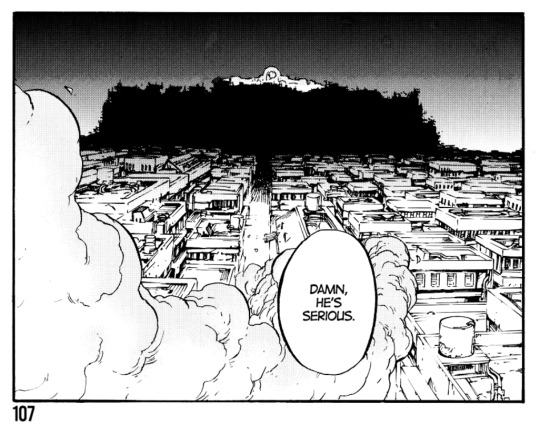
Even without the baos and wonton-fonts on signage, Ryutsu visually does not match with other cities in No Man's Land. It’s not just the citadel which can be seen from afar, but it’s also the crammed housing and confusing architecture. The tone of Vol. 4 shifts and leans towards neo-noir. As this arc's villains move into the city, Hoppered says: "This place is truly the bottom of the dark. [...] We'll walk into a place where the light does not enter." These lines may not be literal but it certainly brings ideas of seedy places. They move through pitch black and eventually…
The big showdown happens at the city's main feature: the Dragon’s Nest District - an area that brings up memories of the old Kowloon Walled City in Hong Kong. No Man's Land is a sparsely populated planet, yet for whatever reason, people have sardined themselves into this city and into this district.
Kowloon Walled City had been called ‘City of Darkness’ and it was possible to move through the city without ever seeing daylight. It carries a bit of romantised nostalgia because of its weird part in Hong Kong colonial history, its uncontrolled and chaotic construction, and its lawlessness (though apparently the ungoverned city was tight-knit and communal). The city became a source of inspiration for a lot of media, but not many films were shot in the city itself. Those that I had seen tended to use the city as a 'cool film location' so apart from the examples below, there aren't many I know to recommend (happy to take suggestions for films I may have missed).
youtube
Clip from Bloodsport (Arnold, 1988)
"No joke, man. It's a random piece of No Man's Land in the middle of a tourist paradise. It goes way back to the old lease agreement between Great Britain and China. Once you step out of the sunlight into the narrow corridors, it's time to protect your nuts, guys."
youtube
Clip from Crime Story (Wong, 1993). This is the climax of the film, which featured actual explosions from Kowloon's demolition, according to its wiki page.
Off the top of my head, good fiction film substitutes (unrelated and unlike Trigun/Trimax) which more illustrate what life might have been like in these places, may be films like Wong Kar Wai's Fallen Angels (1995) and Chungking Express (1994) - though these films take place at the Chungking Mansions, Kowloon Walled City's more modern cousin. I thought of Wong's films because he treated the mansions as a character more than as a location. His films showed examples of immense density, globalisation, and a bit of that noir crime stuff within small and unusually intimate spaces. They also reflected Hong Kong's complicated anxiety as the city was approaching its handover from British to Chinese rule.
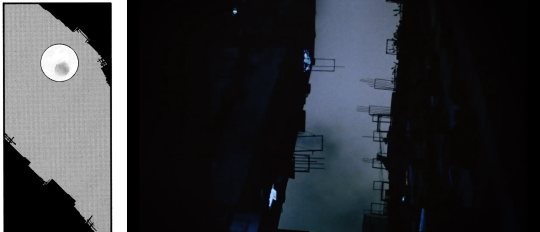
Panel from Vol. 4 Ch. 7; Screencap from Chungking Express (Wong, 1994).
To talk more about Hong Kong cinema itself would be much longer than a tumblr post but if Nightow is connected with Rodriguez's films via Desperado (1995), Rodriguez and his collaborative friend Tarantino are connected with Hong Kong films from those like John Woo and Ringo Lam. One example: Mexican standoffs are tropes used in various films, but we see them frequently enough in Tarantino's films and in Hong Kong action cinema that it becomes noteworthy.
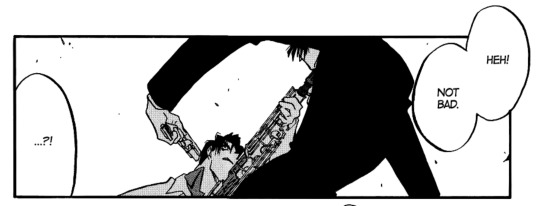
Panel from Vol. 5 Ch. 3
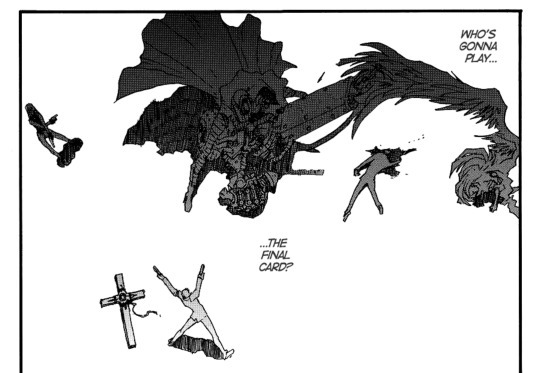
Panel from Vol. 5 Ch. 5
Kowloon Walled City which was demolished in 1993, was visually ‘resurrected’ as Ryutsu's Dragon's Nest. Kowloon Walled City was not a city that just looked interesting. It was an agreement between China and Great Britain that was then kind of weirdly botched, thus leaving it pretty much ungoverned. Trimax Vol. 4 was released in 2000, three years after Hong Kong's handover from Britain to China. We don’t get Ryutsu’s history and with the multiple panels of silhouetted buildings against the night sky and hanging laundry in balconies, Ryutsu’s citadel falls into the 'cool manga location' category. Also, I should be clear: these chapters in Trimax are not an analysis or an allegory of Hong Kong's colonial history.
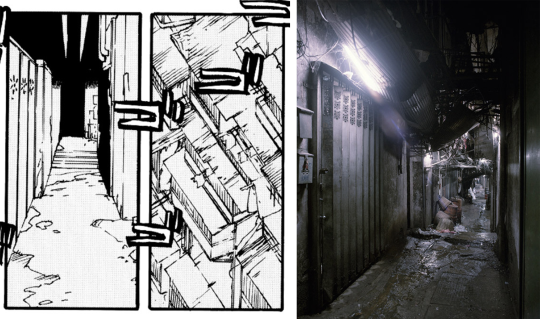
Panel from Vol. 4 Ch. 4; Photo of Kowloon Walled City's alleyway from wiki article.
At the same time, many eyes, including those outside of Great Britain and China, were on the news when the handover occurred. The point is not if Nightow was considering that historic moment or if he happened to be watching Hong Kong films when he was working on these chapters. Instead, I wonder if readers, when they picked up these volumes from the bookshelves, had thought about Hong Kong, Hong Kong’s movies, and Hong Kong’s past and uncertain future, as they were skimming through the pages. But you know… this is 2023 me thinking about 23 years ago. All of this is daydreaming.
I bring up Hong Kong's history and cinema because I wanted to see what I can envision and interpret about Ryutsu and thus about No Man's Land. If Hong Kong via cinema brings imaginations of transnationalism then Ryutsu via Vol. 4 and 5 could do the same for No Man's Land.
There is no literal ocean to divide cities and there are no named countries. There is a broad ‘Federal Government’, so I assume that means the government concerns itself with all settlements in the entire planet. If Ryutsu itself is No Man’s Land’s ‘Hong Kong’ (which opens another discussion of the use and/or misuse of Hong Kong in media - some other time), then despite No Man’s Land being an incredible dystopia, the elimination of borders is, very plainly, very interesting. I am leaning to this being a good thing, considering that one major problem in No Man’s Land tends to be ‘Humans vs. X’ (plants, worms, the planet’s environment etc.). Also, No Man’s Land is already very sparse. No spoilers for later volumes but I am curious about the planet’s future if the population demographic changes.
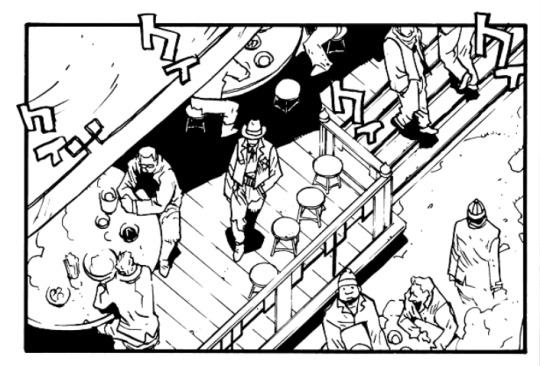
Panel from Vol. 4 Ch. 4. Western and Eastern hats in the same panel.
There are also thoughts about its class struggles. Vash says in Vol. 4 Ch. 4: "There are too many people here. I don't like it. The lower and upper class all cramped together." ... which really made me think about the conditions the upper class were living in. Kowloon Walled City was known to be unhygienic, dark and cramped and the wealthy did not live there, so how rough was it to live in Ryutsu when a rich person might still need to live in the citadel? I didn't interpret Vash's statement to mean 'citadel plus those outside of it' when the high stakes in these volumes were because of the high density and maze-like streets.
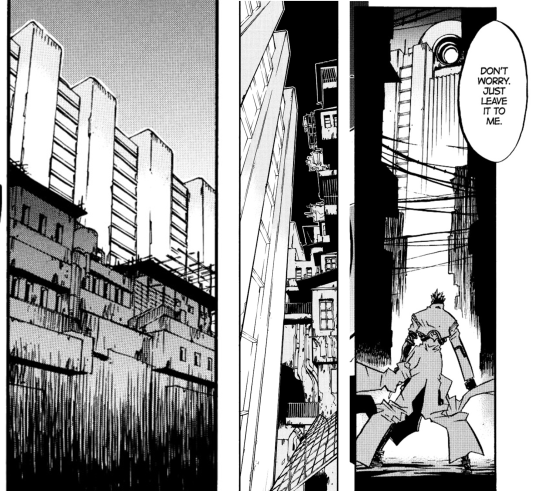
Panels from Vol. 4 Ch. 6; Ch. 7; Ch. 7.
The above panels remind me of establishing shots in gritty crime thrillers than the sci-fi western I had been reading up to this point.
Featured is the Juukei Building - a building that looks pulled from the 20th century. It is tall, drawn sometimes in narrow panels to emphasize its height and to show how small the characters are in the claustrophobic space as they navigate towards it. As characters move through the structure once inside, it becomes more difficult to tell where in the building they are or if they are somewhere adjacent. Combining historical and futuristic designs in Trigun/Trimax isn't new, but it's not often you see 20th century structures. Maybe wealthier residents lived in buildings like this, though the interiors of Juukei look like abandoned offices.

Panel from Vol. 5 Ch. 3.
Or maybe this was meant to be a mixed-use building? But it seems the entire building is abandoned anyway.... So I'm not sure where the upper class is supposed to live or how I should imagine the upper class to be.
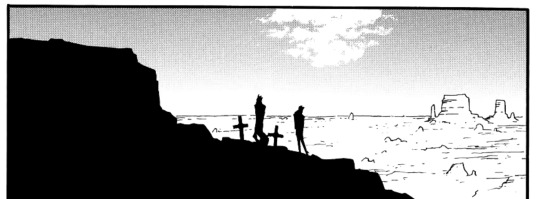
Panel from Vol 5. Ch 6.
... After the end of the battle, once morning comes, we no longer see the citadel. The landscapes return to those reminiscent of American Southwestern deserts. Like we dipped into darkness then we returned to the light.
Anyone who knows about Kowloon Walled City would instantly recognise it in Trimax. The imitative Ryutsu Citadel could be read as a cool manga location where a massive shootout plus some serious revelations occur, but I personally am always interested in what else a location can do. It matters if you set a film in New York City versus a nameless location and how you visually convey that city because it can tell us about its people and helps us understand its characters. So to me, I thought it would be fun to look at certain locations in Trimax (with all of Nightow's free-form inconsistencies and confusions) and imagine or interpret what they can tell us about No Man's Land and by extension, the people in No Man's Land.
Other fun facts include: "[...] Japan, in particular, developed a keen interest towards Kowloon. Its demolition in 1993 was broadcast on national television."
#trigun maximum#trimax vol 4#trimax vol 5#trigunbookclub#kowloon walled city#hong kong#idle thoughts#this got out of control#also tumblr is a terrible platform for long-form rambling#absolute nightmare
82 notes
·
View notes
Note
Hi there! I wanted to hear your opinion about this specific, and common obstacle authors might face. What do you think about writing places you've never been in or barely; and by extension, writing about its people, communities you've never really met, or not often? I'd like for my story to be set in NYC, and the people there, to feel real, but I wonder how legitimate I am with only research (can't travel there atm unfortunately). Love your work and eager to read more of Great Cities. Take care!
Well, I had to deal with this in writing the Great Cities quite a bit, so I can't tell you how to do it, but I can at least tell you how I dealt with it. Never been to São Paulo, for example, or Hong Kong or Istanbul or several of the cities that I "characterized" in the story. Some of that was because I was dealing with a lot of other stuff while working on TCWB (my mom had just died, buying my first home and moving, etc.) and didn't have time for research travel like I usually do, and for TWWM I stopped traveling due to covid. So I had to wing it.
I would say that a lot depends on how much you intend to use the location you're writing about. If it's just background, then you can do a surprising amount with remote observation and research. I used a lot of Google Street View, for example. I popped into Reddit threads for those cities and asked questions -- which is always a little fraught with Reddit, but people were mostly pleased to talk about their towns. I also picked up the Not For Tourists guides for a few cities. Basic info about any city is pretty readily available all over the place.
(Writing about communities is a different story, particularly if those are marginalized communities of some flavor. I always recommend starting with Writing the Other, if you're writing outside your own identity... and even if you're writing your own. It's helpful for reducing stereotypes and replicating exploitative traditions, period.)
If you're using a setting for a whole chapter or something, though, you need to either go there, get locals to talk to you about the place, or -- ideally -- both. In my case that meant talking to friends as well as paying several "expert readers" (like, a person born and raised in Istanbul) to read segments of my writing and offer critical advice. I even needed expert readers for NYC-related stuff -- the chapter of TWWM where Brooklyn goes to court, for example. I know nothing about the city's legal system or even which court is right for which kind of proceeding (we have A LOT of courts, both in the city and the boroughs).
You also need to be okay with making minor mistakes. Recognize that it really isn't possible for any one person to know everything, or even most things, about a city with a population of millions and which effectively sprawls across three different states. I've lived in NYC on and off all my life, and I still got several things wrong when I wrote the Great Cities. I read books and went on tours and learned things about my own city that I've never heard before. While I could and did walk right out my front door and have conversations with people who've lived here all their lives, sometimes there were mistakes in stuff they told me, and only research caught some (not all) of those. I feel like I got the stuff that mattered right, however -- the attitudes, the language, the power dynamics, the way parts of NYC absolutely love to talk shit about other parts of NYC, but will square up in solidarity the instant an outsider tries the same thing.
If your story is about the city, though? Set here? You really need to not just visit but live here for a while. There's nuance you're just not going to get from research or even talking to people. For some things, there's no substitute for experience.
Anyway, hope that helps.
113 notes
·
View notes
Text
✶ ⋅ interview. as a fresh entry into the world of european football, twenty-four year old jesse zhai is dynamicism personified. his years of playing for korea university in the college track has shown explosive growth, with his seamless transition into k2-league team hanseung tigers attracting international attention from scouts. today, zhai joins us in seoul, south korea to explore his new era of professional football.
he wears a distressed, layered shirt, and baggy jeans, styled by french-korean designer arsen ryu, encapsulating a youthful, boyish nature and willingness to pursue change. sitting with us today, he is all bright smiles and bouncing legs, greeting us warmly. close confidants have described him as a ‘friend of the world’, which seems a fitting moniker.
zhai's latest conquest, from the fields of hong kong's youth teams to professional football in south korea, is southern italy's messina football club.
✶ ⋅ so, why italy?
"i think any footballers' dream is to make it to europe, and italy was just the first place to open that door for me. also, i really vibe with the locale, the food, the culture... i want the place i play my sport to also be a place i'd enjoy being in."
✶ ⋅ korea to italy is a big jump. how are you feeling about the distance, the different playing field?
"well, honestly... i'm nervous, i guess. i'm gonna have to adjust to a lot of new things. don't get me wrong, i'm really excited, but i've never been to italy before. i've been to europe, like, once, back when i was a little kid and my parents took me. i don't think that really counts, though; i don't remember anything." a laugh. "but my fiancée's coming with me, so i should probably be okay. she's really smart."
✶ ⋅ your fiancée? congrats!
"thank you! yeah, she's coming to italy with me. she's really excited for it too. when i'm not busy with training and stuff we'll probably go around being tourists."
✶ ⋅ what are you most excited to see in messina?
"the beaches for sure... here, i have to drive a long time to get to a beach, but they're all in walking distance there! i don't mind driving, but i like walking way more."
✶ ⋅ do you have a role model? anybody you look up to in the football sphere?
"kylian m'bappe. he'll always be a legend to me. i studied his games and technique a lot back in college. also, messi. he's the one that really got me into football in the first place. my, uh... my dad also loves him. we used to just talk about him all the time and sometimes he still sends me messi videos and stuff. also, i have his skin in fortnite. so that's like... you know it's real when i got their skin in fortnite. sorry, am i allowed to talk about fortnite?"
✶ ⋅ what are you hoping to accomplish this year football-wise?
"to beat all my goals and break all my records. i think this is when i show everybody how much value i can really bring to the table."
zhai will begin playing in the 2025-2026 season starting this spring. ▍
4 notes
·
View notes
Text
Lucky Cat Indeed!

In their latest act of extreme trickery, a rouge group of chaotic Taoist magicians has empowered a collection of "Chinese Lucky Cat" statues, including "Lightning Tiger Dao." The results? See below:
Spread throughout tourist gift shows in Singapore, Hong Kong, and various Chinatowns in America and Canada, the cat bestows a different sort of luck. Remaking the person nearest to them when they activate into a 100% Chinese version of themselves.
So that Jimmy Smith though he was giving his girl friend as cute will present of a lucky cat statue to his girlfriend Laura Fields
What he was really doing was giving himself the chance to get to know her as Xiang Li Fang.

Renée Taylor, while visiting Hong Kong, thought that a Lucky Cat was just the souvenir to bring home to Montana. "Maybe it'll help me visit again soon." she thought.

Ren Liu Tian instead found she would be looking for a place to live in the city instead. To say nothing about now needing a whole new passport and a need to relearn English.

Hanna Field thought the little shop in Chinatown was the cutest, most quant thing she had ever seen.

As Yu Ming Han, a new employee of the shop, it became a lot less quant and turned into just someplace where she worked.

One of the more interesting bits of their Taoist Chaos magic happens when Desiree and Bill Costello take a short rest as one of the Lightning Tiger Lucky Cats acted up.

So that after a dizzy moment, they became Deng Cai and Bill Costello. So that before most of their meals had come via Grub Hub deliveries, then became home cooked better-than-Chinese restaurant dinners.
9 notes
·
View notes
Text
First Night in Bangkok
Christopher Hitchens once said that however hard you try to avoid cliché, visiting communist Czechoslovakia forces you to reference Kafka at some point.
Anyways, Bangkok really is a fucking trip, man. I feel like I died two days ago and reincarnated in a William Gibson novel. So very much.
Inhuman cybercapital futurity assembling itself in a thousand gleaming Hong Kong-domiciled gigabanks and digital nomad cafés and dancing girls as it chokes old Buddhist temples and shantytowns and struggling palms in a traumatically transcultural miasma of a myriad reactive nitrous oxide species coughed up by a million two-stroke motors.
After a brief nap in my luxury burbclave hotel, security guard and English-fluent beaming hotel staff staff at post, me trying to do battle against 15 timezone hours' worth of jetlag, I register for the first time that I've been dissociating. I'm hobbling around on the air cast I wear for my foot sprain and a collapsible Walgreens cane, of the kind I imagine two-bit hustlers using to beat drug dealers poaching on their turf. But I'm in my favorite mass-market synthetic ink tie dye shirt, made somewhere in Central America I don't recall off hand, my blue tourist shorts, and my Buddhist beaded mala, engraved with Sanskrit I cannot read, on plastic draw string, so hopefully everyone knows I'm a chill dude.
I am in an eight floor mega shopping mall. There are robots serving white frat boys and dutiful waiters in white masks who could be robots serving local Thai prep school kids in sky blue school uniforms 500 baht sirloin steak dinners.
There are as many languages spoken here it feels like as New York City. And hotels, restaurant, massage parlors, tailors, purpose built to pander to rich Arabs, rich Chinese, rich Americans.
There is a strange amodernity to all the floating signifiers. White spring break kids approximating Thai names and wai hand clasps. Chinese shirts with a Markov chain’s chants of floating English prestige nonsense. Transcontinental fake gold watch arbitrageurs. More virtual market makers than a Jersey City server farm somehow spun up and cast into human form.
Sub-orbital resort vacationers in one corner. The state messages of the network monarch on a giant billboard overlooking a four-story expressway overpass on another. Everyone communicating in signs, gestures, and humble Buddhist bows. Hindu, Christian, Mormon, Jew, Shiite, Sunni, and so many Buddhists, all sitting and eating and shopping and praying and coughing and sputtering and fucking and bowing to one another at the end of the world before the self-aware chatbots reconstitute all the anthropomass on the third rock from the nuclear furnace. And of course, on TV, a narcissistic reality TV star in orange bronzer and an oversized navy blue Brioni suit and red tie is inaugurated president of the United States for a second time.
And my $4 dinner, served by surgically masked waitstaff at the shopping mall of the omega point. The terminal object in the category of mass market commercialism. Another floating signifier: a featured photo on Wikipedia of beautiful Jackson Hole, Wyoming, where I've actually been, here mobilized as a metonym for the kind of steak restaurant this place is supposed to be. Of course, probably no one who works here has been to America. It reminds me of Gilles Deleuze’s characterization of capitalism as an inherently deterritorializing process—one that makes every place into every other place, until no one knows where they are.
And the strangest thing is that somehow, between the tourists trying to immerse themselves in the fakery, and the shop workers trying to perform, something genuine is created, even though the thing the performance refers to is fake—and everyone knows it.
Actually, maybe the craziest moment was when I was walking past the clothing hawkers. Of which there were just so unbelievably many. And they were selling wildly unlicensed branded merch for Luis Vuitton and Ralph Loren and Balenciaga and GUESS, etc. Some of them laughably implausible. But others effectively the real thing. The Asian tourists love those in particular. And I asked myself, “how did these knockoffs get so good?”
And then I remembered: Thailand is the place where all of this crap actually gets made! It’s all outsourced to here. They’re just cutting out the middle men seeking rent on the brand. And so I’m not really sure who’s the fraud here. Is it the unlicensed shirt hawker trying to take me for a ride and fudge their “tax” calculations? Or is it the Italian fashion house trying to charge me 20x what it costs the Thai sweatshop workers to make?
I see a case for each.
Obviously not JUST Thailand makes this. There’s also Sri Lanka, Bangladesh, Honduras, Costa Rica, etc. All the groveling satellite states trying to scramble up the value-added ladder that capital and IP and telecom flows have turned into the 21st century's Manchester. All part of that big globalized textile mill.
Anyways, I got a pretty nice white dress shirt for like $15 and a truly label-less white bucket hat for $5. And I’m almost sure I got taken for a ride, but I was waaay too tired to haggle, and anyways, by any standard of justice as globalized as these clothing flows, I'm the one taking them for a ride.
I message my mother, half way around the world. It's 7:30 AM on the Eastern Seaboard of the US. It's 7:30 PM here in Bangkok. My mother says, "Keep your wits about you, man. You have to play the haggle game. It's in your Albanian blood. My grandmother would have taught you plenty, had she been there."
I can't help but think that they’d have been like, “no, please! Just take it! For free!! ” after 3 minutes of that. Those Bangkok street hagglers have never met an Albanian orphan.
Gonna go to a Buddhist temple tomorrow. First, tonight, a cocktail bar overlooking the city. In my $1000 black John Varvatos jacket with the Mandarin collar over the $15 off-brand shirt I just bought.
6 notes
·
View notes
Text
Hot Instagram Check-in Spots in Hong Kong

Hong Kong is famous for its unique and beautiful locations, where every corner can become an artistic photo. Below are the hottest check-in locations today, which are the places that attract many tourists to take photos and share on Instagram, which ThankTrip has compiled below.
#thanktrip#travel#travel tips#travel blog#trip#trip planner#tourism#travelblogger#explore#traveltheworld
2 notes
·
View notes
Text
Black lagoon: Cain Blood, Rock, Mr Chang
Chang settled back in his chair as Rock faces him. A well build Black youth is also there.
“ Things are progressing quite smoothly” he stated.
“ Dino Golzine maybe dead, , but Yut Lung’s gang turned on him” he pointed out.
“ Well if only we had a Japanese diplomat to smooth things over”
“ No need to play games, Mr Chang…..” Rock bites back his anger.
“ Don’t be a sore Loser Rock”
“ You haven’t won yet”
“ You think I care whether Yut Lung can kill some tourist or not? See Rock, I look at the bigger picture. Which is why your here. Sing and Yut Lung become divided due to the issue of Golzine killing his former leader and cousin”
“ So if Yut Lung presented Golzine’s body to Sing and his gang as a token of apology then things should be smoothed over” Rock realizes.
“Except I know there’s something more selfish in Sing Soo Ling’s heart, there always is. . I just have to find out what it is.”
“ Are you guys going to keep yammering away in Japanses or are you you going to fill me in?” the youth asked
“ Sorry, where are my manners, Rock this is Cain Blood, Leader of Black Sabbeth”
“ Nice to meet you”
“ You said you had some information regarding Ash Lynx and his war?” Cain said bluntly
“ I’m surprised you got involved in the first place….from what I understand your the type to stay out of white guy shit” Chang said.
“ Honestly, baby I was just supposed to make sure the streets were clear, then Arthur Fredrick capped one of my men.”
“ We need you to pull out, we’re not on Golzine’s side so it's of no cost to your principals” Rock explained.
“ You want Ash Lynx” Cain’s eyes narrowed.
“ Did he tell you the Lee Family where involved?” Chang asked casually
“ Well, shit” said the youth looking troubled. “ May I ask how much?”
“ The Lee’s are Golzine’s biggest allies at the moment….”
Cain stood there “ So your saying if I keep my alliance with Ash me and my guys will be up against the Hong Kong triad?”
“ Lets be real here Mr Blood, Ash’s attacks so far have been wreckless. You and Sing’s gangs have been used to minamize damage to his own guys.”
Rock noticed Cain’s composure slip slightly at Sing’s name.
“ You know Sing Soo ling was arrested recently for trying to betray his own leader” Chang explained.
“ I see” Rock see’s a bead of sweat appear on Cain’s forehead…
Rock knocks on Yut Lung’s door, the boy tries to slamb it in his face.
“ I know your mad at me and your right to be, but hear me out. I have some ideas about what to do about Sing and his gang”
Yut Lung tentatively opens the door and folds his arms “ You have ten seconds”
Rock walks past him and sits on his bed.
“ I think you should spare them”
“ No, I won’t forgive him!” Yut Lung yelled throwing a makeup kit at the wall.
“ What are you going to do execute him?” Rock demanded “ Chinatown is already furious about Shorter Wong”
Yut Lung winced.
“ If you kill another family member of your most loyal supporters, you could have a full uprising” Rock explained. “ Sing was only angry because he felt you betrayed him for Dino”
Yut Lung froze his eyes filling up with guilt.
“ What if I spare them and someone finds out about what happened Rock?”,fear entering his eyes ”
“ That’s true but what if we came up with a way to make it look like your trading Sing’s life for personal gain?”
Yut Lung looks at him “ That might work what did you have in mind?” he twirls his hair.
“ You know Cain Blood”
“ Ash Lynx’s ally he’s the boss of Black Sabbeth”
“ He’s friends with Sing, you could trade Sing’s life and that of his men for an audience with his leader”
“ You want me to make Ash’s allies mine? That’s not a completely awful idea….cut him off from his backup”
“ Exactly, but i’d also recommend an apology to Sing and his gang. He was only angry because you picked Dino Golzine over him”
“ You betrayed me as well” Yut Lung said sharply. “ But ,thank you i’ll try your plan….its a good one”
“ For what its worth I didn’t mean for you to get hurt” Rock said.
“ I hate how you look down on me” Yut Lung’s eyes narrow. “ I’ll need more then empty words, Rock lets take a little trip to the morgue.”.
#black lagoon#lee yut lung#banana fish#yut lung lee#rock#Cain blood#mr chang#crossover#YL forgave Blanca I think he'd forgive Rock#Cain risking his gang for Ash makes no sense
2 notes
·
View notes
Note
Cas, where's your favourite place on Earth that you've been?

"I've visited a lot of beautiful places. There was a magnificent glacier on Gondwana in what is called Saudi Arabia today. I loved the tropical rainforest of the Sahara. I also really enjoyed standing on top of Mount Everest on sunny days. Of course, now there are a ton of tourists every day." He makes a face that expresses what he thinks of people climbing up there (and dying). "I recently discovered Hong Kong Park, which I think is my favorite place in this century."
#( anon )#(this fucker is around since before Earth was Earth)#(a lot of his favorite places aren't around anymore)
2 notes
·
View notes
Text
Tomorrow Will Be Different 1
Chapter 1 out of 26
Instead of managing to meet up later, Oliver has to keep running with Akio. The only way to keep them safe is to go public with Oliver being alive, leaving him back home in charge of Akio, while Tatsu and Maseo are still in the wind.
Oliver has to get used to being back home where he doesn’t fit there anymore, while also taking care of a child and getting caught up in a larger conspiracy that keeps the existence of the Alpha-Omega virus secret. In the meantime, his primary mission is to reunite Akio with his parents, something that isn’t the easiest when being back from the dead and in the spotlight.
On AO3.
Ships: none
Warnings: none
~~~
Chapter 1: A Fucking Shitshow
Oliver is mentally cursing as loudly as he can, but trying not to do it out loud. If they all make it out of here alive, he doesn’t want to risk facing Tatsu’s wrath should Akio pick up anything from him and repeat it.
He wishes he could swear, though, because the situation is an absolute shit show.
What feels like only hours early, everyone was in good spirits, saying their goodbyes, before finally being able to go home. Then there was gunfire everywhere, the four of them crossed by Amanda, if the agents were anything to go off. Now, he’s on the run with Maseo and Tatsu’s kid in tow, suddenly responsible for keeping something so very precious safe.
If he’s honest with himself, he doesn’t think he’ll ever forget Akio’s screams for his parents as Oliver held him close, so that he couldn’t run to them. Maseo told him to get Akio out of there and he knows the two Yamashiros still out there can handle themselves, but if they’ve died, if Akio never sees his parents again after that moment, Oliver isn’t sure he’ll be able to forgive himself. If Akio will ever forgive him.
However, he can’t think like that. His own fate has taught him that he shouldn’t assume anyone is dead until he’s sure, that people can survive some crazy shit. He just needs to trust that he can reunite Akio with his parents, he just has to keep him alive until then…
Which is the shit show in question that Oliver has found himself in. Sure, he’s gotten pretty skilled at disappearing in crowds and keeping an eye out for those after him, but he’s never had to do it with a kid. He’s never been responsible for a life other than his own.
Right now, he mostly feels lucky that Akio is a tough one, who is used to his parents’ life and all it entails, having already been uprooted before. And that he idolizes Oliver enough to trust him when he says it’s all going to be okay, letting Oliver lead him through the crowd with the blind belief that he will get him back to his parents safely. Oliver hopes he’ll never have to break his heart by letting him down about that.
Hong Kong is a busy city, for that Oliver is grateful, because it makes disappearing into a crowd that much easier, no matter how foreign he looks.
The two of them get some looks, however. Probably because Oliver looks like a kidnapper next to Akio. The fact that Akio is complaining about wanting to go home, doesn’t help their case either. It might only be because they’re in Triad territory that no one steps in.
Oliver should probably get them to a more tourist-y part of town. Not only will Oliver look less out of place, but Amanda should be less likely to start shooting there, not wanting to risk an international incident by accidentally getting a vacationing American in the cross fire.
These plans get ruined when Akio runs off suddenly, calling out for his father. Oliver sets chase, but it seems his assumption was right. While people don’t actively stop him, they do hinder him. If Akio is set on running, they’re giving him a chance. The crowd has closed up and Akio is out of sight, leaving Oliver to try and breathe through his panic as he scans everyone, hoping to catch a flash of the kid.
Without Akio there, Oliver allows himself to curse out loud. “What a fucking shit show.”
“Oliver?” Akio’s voice is right behind him. Oliver whirs around as fast as he can, unable to process the wave of relief crashing over him other than kneeling down and sweeping Akio up in his arms.
People are still giving them wary looks, but Akio came back voluntarily and no one wants explicit trouble. All continue on with their day as if the past minute or two hasn’t happened. Oliver can’t even find it within himself to be mad about it. Still, he cradles Akio close, not wanting to lose him all over.
Eventually, he forces himself to let go, scolding Akio about never disappearing like that again. His heart breaks slightly when Akio responds: “I thought I saw my father, but it wasn’t him.”
He knows this isn’t easy on him. All Akio wants is to see his parents again, Oliver understands the feeling, just hours earlier he thought he was going to see his mom again – properly this time – having that ripped away is soul crushing.
Fortunately, it seems that Akio’s reunion is closer than Oliver’s, because Tatsu and Maseo were smart enough to agree on a meeting point in case this exact situation arrived. The two always knew the possible dangers, shielding Akio as much as they could from the kind of life they lived, but never leaving him unprepared. Oliver has always admired that about them.
However, the botanical garden is a bust.
Oliver should have known it wasn’t going to be that easy, but he can’t help but feel crushed that this nightmare isn’t over for Akio yet.
His hand feels so small in Oliver’s, wrist fragile, easily broken by his hands. Oliver isn’t made to care for fragile things, why did he ever think running with Akio was a good idea? Why did Maseo think it was a good idea to tell him to run with Akio?
Those aren’t thoughts he has time to contemplate now, even if they cross his mind as they run for their lives.
With men hot on their trail and Oliver standing out as an American, it becomes clear that Akio doesn’t have the stamina to outrun them. Much like he’d done at the docks, Oliver makes the executive decision that Akio’s life is more important than his immediate comfort, so he scoops the kid up, tossing him over his shoulder and sets out in a proper sprint, like he couldn’t do before.
Akio jostles in his grip and lets out a complaint as he grips Oliver’s shirt as tightly as he can to avoid getting bounced too badly.
Hong Kong is crawling with Amanda’s men, they have to go underground for now and look for Tatsu and Maseo later. It’s no use to go looking when they’re probably also hiding. Hopefully Akio will understand, he thinks.
They’ve put enough distance between the men following them and themselves that Oliver risks putting Akio down on his feet again. The boy frowns at him and says: “That was the worst piggy back ride ever.”
It’s so out of pocket seeing the circumstances that it tears a surprise laugh out of Oliver. Despite the horrible day, Akio manages to stay himself, a small bright point in the shit show. Oliver smiles and ruffles his hair. “I’m sorry, buddy.”
“Forgiven,” Akio smiles back easily, taking Oliver’s hand so that the two can make their way through the crowd.
They’re in the more tourist part and look less out of place. Still, Oliver ducks into a shop, pulling out some of the clothes for him and Akio, tugging a cap onto Akio’s head and offering him a jacket, while Oliver himself stuffs his jacket in a backpack along with his hat, replacing it with a cap of his own and a different sweater that has the sky line of Hong Kong on it.
With their appearance properly altered to look more like tourists, they fit back into the crowd. Oliver takes Akio to get some ice cream, tucking the two of them away in the back of the shop.
Akio seems delighted by the big desert Oliver lets him order, happily scooping the sweet treat while Oliver mentally regroups and keeps an eye on the passing crowd to see if Amanda’s men are still nearby.
He doesn’t know anyone here that would owe him a favor and let him stay. He contemplates going to the American embassy, but quickly disregards the idea again. Amanda is part of the American government, she would get him there easily. Best to stay under the radar.
There are a lot of hotels nearby, if he can sneak into an unoccupied room he can probably pass for one of the many visitors. Akio would have to stay in the room to remain unspotted and out of danger, but it would keep him safe while Oliver looks for his parents. But hotel rooms are unlikely to remain unoccupied. Maybe he can just check in? But he doesn’t have a lot of money, not to mention no ID. Plus, what if someone recognizes him?
The second rumors about returned billionaire Oliver Queen start doing the rounds is when Amanda will move in. Too risky.
He’ll have more chance in the business district, he thinks. He can play the part of American business man well enough to not get noticed in the crowds. He and Akio can take refuge in an abandoned office building, his days of finding sniper’s nests in the city finally paying off, since he knows where those are.
A lot of them are also known and used by A.R.G.U.S., but Oliver knows which ones aren’t. If he’s lucky, he might be able to get his hands on a proper gun so he’ll be able to turn it into an actual sniper’s nest to keep Akio safe.
With a plan in mind, he feels much better. Akio is done with his ice cream and Oliver leaves some cash behind, not wanting to attract attention by not paying.
He keeps his head on a swivel – the only way to survive and basically second nature – as they stroll over the streets. Their pace is leisurely, fitting in by moving at everyone else’s speed. Oliver tries not to think about the fact that people likely assume he’s Akio’s father, both because he doesn’t want to think about everything that has led him to temporarily taking up the roll as guardian and because he’s only twenty-five and Akio nine. He’s way too young to be Akio’s dad.
Right now he can’t conceptualize how he almost was a father before he left on the yacht. He didn’t feel ready then, his lifestyle way too rowdy and free to fit in a kid. He’s double glad he isn’t a father now, with the kind of man he has become, the darkness inside of him, he shouldn’t be allowed near a kid.
It makes his mind boggle again that Maseo trusted him enough to tell him to take Akio and run. He knows what kind of man Oliver is, the things he has done.
Sure, Maseo also killed for Amanda, worked for A.R.G.U.S., and Oliver has seen enough from Tatsu to know she isn’t innocent either. However, they still love so easily. Their darkness isn’t overpowering. They found the right balance, the kind Shado had been talking about. Oliver doesn’t know if he’ll ever have that or if he’ll always be shrouded in the dark.
He shakes the thoughts off, he has a mission to focus on not his own meandering mind.
Oliver spots another clothing store. He’s still grimy from all the running around, which isn’t the best, but clothes help a lot. It’ll be their third outfit today, harder to follow them that way.
Akio is confused and a little annoyed. He complains: “Why are we getting new clothes again? We already did that. When are we going to see my parents?”
How Oliver wishes he had answers to that, but he doesn’t. All he can do is give a sad sigh and squad down in front of the kid. He says: “Akio, your parents are hiding, like we are. We’re going to find them, but it’s going to be tomorrow. Tonight you and I are going to have a sleep over, okay? Like camping. You’ve ever been camping?”
“No,” Akio answers reluctantly. “But why are they hiding? Why are we?”
“It’s like hide and seek,” Oliver tries to explain. “The bad men are seeking and we’re hiding. It’s hard to hide and seek at the same time, so we have to wait until the bad men stop seeking until we can start seeking your parents.”
“I guess,” Akio pouts, shoulders slumping.
Oliver wants to do more for him, make him promises, but he won’t keep them. It can take a while before they find Tatsu and Maseo again and it won’t be easy for Akio. He feels wholly out of his depth. Hopefully he won’t royally fuck this up.
There is nothing he can say right now, but Akio has given up fighting and easily lets himself be led to the clothing store. Oliver picks out a button up for both of them, deciding that with the jeans they might pass for business casual, father taking his son out to show him around the business part of town.
He can still remember his own father showing him around Queen Consolidated, even as a small child. Back then, he had no clue what it meant to be the owner of that building, now – having seen the dirty parts of power – he understands better than ever. He still doesn’t know what his father means exactly by not being the man Oliver thinks he is, something he said both on the life raft and in the video, but Oliver can imagine.
But it isn’t the time to dwell on that. He puts all of their stuff in a suitcase, makes Akio’s hair as neat as he can and ties his own up in as sleek a pony tail as he can get. His hair isn’t as long as Maseo’s, but it’s getting there and tying it up like that will make him fit in better and alter his appearance more.
With that done, the two set off to the business part of town, the one close to the botanical garden, just in case. Sheung Wan, Oliver thinks it’s called.
Like Oliver suspected, they don’t turn many heads and his apparent confidence in where he’s going, means that no one questions them. An abandoned office building is easily found and with a final glance around, Oliver breaks a lock and they go inside.
Oliver picks the office on the highest floor that is closest to the fire escape, but has the best sight lines. It’s not perfect, but it’s the safest they’re gonna get.
Leaving Akio there by himself is hard, but he knows it’ll be easier to move around on his own, so if they want supplies, it has to be done. Still, he checks a thousand times if Akio is okay before he leaves, making the boy promise that he’ll stay under the desk.
Scrounging things up to make their stay more comfortable while staying inconspicuously isn’t the easiest, but Oliver manages to get some food and a blanket at least. Hopefully that will be enough to keep Akio comfortable, Oliver is used to sleep without anything, he’ll manage. He just doesn’t want to deliver Akio back to Tatsu and Maseo having made something horrible even worse.
They probably won’t approve of his snacks for dinner, but he sold this as a sleep over and Akio’s eyes light up when he shows off his haul. He can be a good bad influence for a night. The kind he used to be before he drowned, though perhaps a little less destructive.
He entertains Akio with stories from his own childhood, editing them slightly so they’re more kid friendly. It’s reminiscent of the days he has spend with Thea and he misses her now more than ever, even more than after when he just saw her. She has changed so much now, all grown up …falling into the same bad habits he had. He wonders if he’ll ever get the chance to go home and be a better influence to her, like he is to Akio now.
The whole thing leaves him feeling morose and he’s glad when Akio finally drops off.
Akio is using his thigh as a pillow, the blanket wrapped around him both against the cold and to give him something softer to lie on than the musty office carpet. It’s the best Oliver can do for the moment, but he hopes for Akio’s sake that their circumstances will change soon.
Oliver himself sleeps fitfully, keeping himself semi-alert as he dozes sitting upright under that desk they have hidden under ever since their got there. He can’t help but wonder if they’re ever going to make it out of this alive. If Tatsu and Maseo did. What tomorrow will bring.
He doesn’t have any answers, but he feels like this is another turning point in his life, much like getting to Lian Yu had been or waking up in Hong Kong. Something new is coming for him, he just hasn’t figured out if that’s a good thing or not.
#rr writing#arrow#green arrow#cw arrow#arrow cw#arrow 2012#oliver queen#akio yamashiro#maseo yamashiro#tatsu yamashiro#arrow season 3#arrow hong kong flashbacks#arrow au#arrowverse#arrowverse fanfiction#arrow fanfic#amanda waller#tomorrow will be different#dc#dc comics#detective comics
3 notes
·
View notes
Text
Independent Excursion 1: Academic Cultural Reflection of Night Markets.
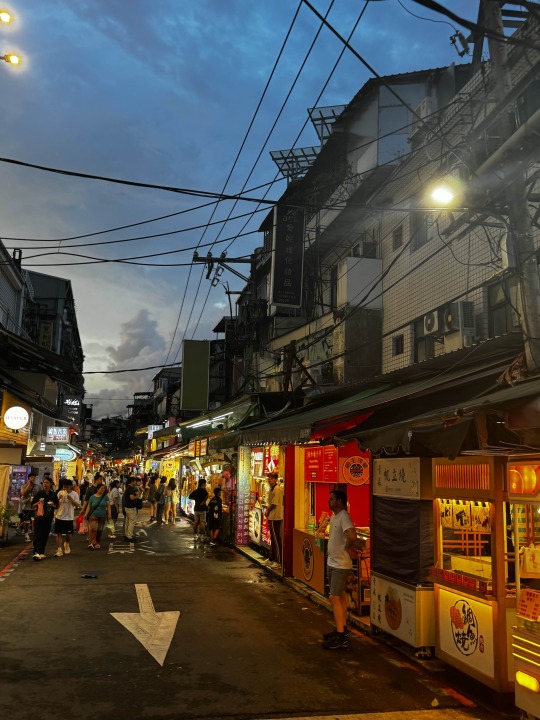
I’ve gone to an absurd amount of night markets throughout our numerous days in Taiwan, both independently and with the entire study abroad group as an excursion. I’ve been to most night markets around the Taipei area but the one I’ve gone to the most by far (a whole three times!) is Shilin Night Market. Not going to lie, I’ve definitely spent well over $4000 NTD within the few hours I’ve been there. There’s such a huge variety of different stalls, ranging from clothing stores, to arcade style challenges, to claw machines, and of course food.
Faith and I had gone to the Shilin Night Market on our 2nd day officially in Taiwan (we had come to the country a few days before the main group arrived) and it was my first real experience of one. I’ve been to Chinatown in New York and have heard tales of my mother’s haggling adventures in Hong Kong secondhand but the reality was even better than what I could imagine. There was so much to see and do it was almost overstimulating.
When googling “things to do in Taiwan”, night markets are guaranteed to be on the list. Frequented by both natives and tourists alike, they’re a crucial part of Taiwanese society. It’s a center for fostering community, stimulating economic growth, preserving current culture and innovation. But what draws people to night markets in the first place? This study from Chuang et al. (2014) finds that the main contributors to the high number of people going to night markets being “the low unit prices, with products under US$3.30 compromising approximately 70% of [the market]”, the festivals/performances, and the servitude of the vendors.
Being someone who has gone to multiple night markets in my short time in Taiwan (just a bit over 2 weeks!), I completely attest to all points given. I've noticed that the pricing of things here are pretty similar or even more expensive than it is in America, with the main price disparity being the food costs. How could I resist myself from trying as much food as possible when it’s so cheap?
But don’t let all my yapping about food fool you: night markets aren’t just a place to eat. Because of how ingrained they are into Taiwanese culture, they also act as social gathering spots where family, friends, and colleagues alike can come together to mingle about and enjoy a unique atmosphere unlike anywhere else. I had such a fun time going around the night market, both alone, with Faith, and with a huge group. It’s a different experience every time and I’ll really miss it when I go back to boring Gainesville.
In recent years, though, local Taiwanese government has been actively trying to curtail the prevalence of night markets, they continue to flourish in modern times, though not to the same extent (Taipei Times, issue 09/05/2009). I didn’t initially understand why the government would be trying to make night markets less prevalent in society considering how it makes up such a huge part of its society, but upon further research, I understand why.
It’s not the most hygienic place: the stalls are tightly packed and air-flow isn’t the best. COVID-19 only exemplified these concerns, as the crowded nature of night markets was a super-spreader hub. The noise and waste generated by the night market can also be detrimental to the environment and the people living next to them. Despite all these downsides though, the importance the night markets serve cannot be denied by anyone, which is why they’re still so many today despite such a large number of concerns. They also act as competition with more formal business - the ones we see more often in America. It's a delicate balance between preserving culture and reducing health and safety concerns. Tai, W. P., & Chang, J. (2015)
These night markets are a livelihood for thousands of Taiwanese citizens but contrary to what I had assumed before, the vendors at the night market aren’t only those who can’t find employment elsewhere but, in fact, are mostly people who chose this profession as an alternative to the traditional “dead-end laborious 9-5 white collar jobs” (Liu, Yu. 2009).
Though I hadn’t put much thought into this initially, this really does make sense. East Asian societies put a huge emphasis on education, big company jobs, etc, and Taiwan is no exception. Being a child of Chinese immigrant parents myself, I know just how much the pressure is to “succeed” both academically and professionally. I completely understand why the youth would be drawn to this. To those who are tired of the mundaneness of everyday life, tending a stall in the very night market they might have grown up going to seems like such a wonderful escape from the “rat race”.
6 notes
·
View notes